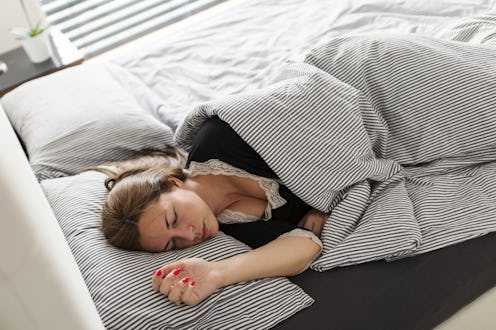Life
7 Insomnia Cures That Sleep Experts Swear By
If you're someone who has suffered from insomnia, you've likely tried everything under the sun to help yourself fall asleep at night. Counting sheep may not help, but there are a number of other different cures for insomnia that sleep specialists swear by that might be worth a shot. Sometimes, the answers to your sleep problems just involve some out-of-the-box solutions, and who better to advise you on these odd habits then the sleep experts themselves?
"Insomnia is a disorder characterized by repeated difficulty with either falling or staying asleep, despite adequate opportunity, condition and time to do so," Dr. Lee-Chiong, sleep expert, professor at National Jewish Health and Chief Medical Liaison at Philips, tells Bustle. "People with insomnia typically complain of impaired daytime functioning. It can arise from hyperarousal of the body (cannot relax) or brain (cannot shut off my thoughts)."
Unfortunately, people with chronic insomnia may develop lifelong habits that seem reasonably beneficial to falling asleep but instead might create the negative effect of persistent and worsening sleeplessness, says Dr. Lee-Chiong. On the other hand, some recommendations may sound counterintuitive, but might actually be helpful.
If you're consistently having trouble falling asleep at night, try your hand at one of these seven insomnia cures that sleep specialists swear by — no matter how odd they sound.
1Think About Staying Awake
If you struggle to fall asleep at night, try a technique known as paradoxical intent. "It sounds counterintuitive, but for those that find it difficult to sleep because they keep worrying about not falling asleep, do the opposite," Dr. Sujay Kansagra, Mattress Firm’s sleep health expert, tells Bustle. "Instead of worrying about falling asleep, think about staying awake. This often lessens anxiety and gives your mind a chance to relax enough to fall asleep."
2Take A Hot Shower
Still tossing and turning? Hop in the shower and turn the heat up. "The body temperature drops when we fall asleep," says Dr. Kansagra. "Taking a hot nighttime shower just before bedtime artificially raises the body temperature. The subsequent fast drop can make it easier to fall asleep and get you in the mindset for bed."
3Wear Blue Light-Blocking Glasses
If you're someone who stares at your computer screen or phone screen all day, you might want to consider wearing blue light-blocking glasses during the day. "Blue light-blocking glasses help our natural melatonin peak, by blocking blue light, which looks like the sky and keeps us awake," sleep doctor and psychiatrist Dr. Alex Dimitriu tells Bustle.
4Use A Weighted Blankets
Some people are turning to weighted blankets to help them fall asleep at night. "This might help recreate the coziness of being in the womb," says Dr. Dimitriu. "Research is mixed, but people's reviews seem to be glowing." Weighted blankets apply pressure to the body that can feel like a hug or a massage, which can be relaxing to many people and help them drift off to sleep.
5Turn Down The Temperature
Time to turn down that thermostat. "It’s been shown that the more our temperature drops during the night, the deeper we sleep," says Dr. Dimitriu. "A cool bedroom can help make this happen." According to the National Sleep Foundation, the ideal temperature for sleep is between 60 and 67 degrees Fahrenheit.
6Hide Your Clock
If you can't sleep at night, consider hiding your clock. "Tell me if this sounds familiar: You know you have to get up at a certain time, you're stressed because you stayed up too late, and now you're staring at the clock, repeatedly calculating how much sleep you're going to get (or not going to get)," certified sleep science coach Chris Brantner tells Bustle. "Well, it turns out, staring at the clock isn't so good for you. In fact, it can end up making you more anxious, which will make it harder to go to sleep."
7Progressive Muscle Relaxation
Progressive Relaxation is a technique used to control stress and anxiety and help relax the body. It works by first tensing your muscles and then relaxing them. "The sequential tensing and relaxing of various muscle groups throughout the body, beginning from the head and neck and down to the arms and legs, can be coupled with diaphragmatic breathing and mindfulness stress reduction," says Dr. Lee-Chiong.
If you struggle to fall asleep at night, try incorporating some of these tricks into your routine or speak to your doctor about what you can do to help you sleep better at night.
